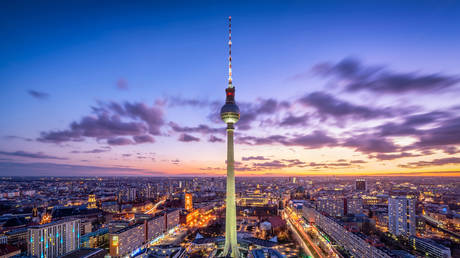Germany likely to experience its longest post-war recession, according to data
The EU's economic powerhouse has faced challenges due to ongoing inflation, elevated energy costs, and subdued foreign demand, as reported by Destatis.

The German economy has experienced a contraction for the second consecutive year in 2024, marking the first such occurrence in over two decades, as reported by the country's federal statistics office, Destatis, on Wednesday.
Official statistics reveal that the gross domestic product decreased by 0.2% in the past year, following a decline of 0.3% in 2023.
As the largest economy in the Eurozone, Germany has lagged behind its counterparts in recent years, primarily due to a protracted downturn in the manufacturing sector. The transition from affordable Russian gas to pricier liquefied natural gas imported from the United States has surged energy costs, hitting manufacturers and small enterprises hard.
Destatis president Ruth Brand attributed the downturn to “cyclical and structural pressures.”
“These include increasing competition for the German export industry on key sales markets, high energy costs, an interest rate level that remains high, and an uncertain economic outlook,” she noted.
According to the report, exports, which are a vital component of the German economy, experienced a 0.8% drop in 2024. Industrial production also stagnated, illustrating the challenges in maintaining global competitiveness amid rising production costs.
Household spending, another critical economic driver, fell by 1.5%, largely due to ongoing high inflation and declining purchasing power. Furthermore, the construction sector faced a significant contraction of 3.8% as escalating raw material costs and high interest rates took their toll.
Rising expenses have prompted closures and bankruptcies across various industries, impacting major companies like Volkswagen. Germany was the only nation in the Group of Seven to witness a contraction in 2023.
Recently, the Handelsblatt Research Institute issued a warning that Germany's economy is on track for its longest post-war recession, with a third consecutive year of contraction anticipated in 2025. This downturn would exceed the two-year recession seen in the early 2000s and is attributed to the cumulative effects of an energy crisis, persistent inflation, and the COVID-19 pandemic, per the HRI report.
This latest update from Destatis comes just as Germans prepare to head to the polls next month, following the collapse of Chancellor Olaf Scholz’s coalition government in November due to disagreements over Ukraine aid and economic strategies. A confidence vote in December resulted in the chancellor losing his position, leading to the dissolution of parliament and the announcement of snap elections scheduled for February 23.
James del Carmen for TROIB News
Find more stories on Business, Economy and Finance in TROIB business












